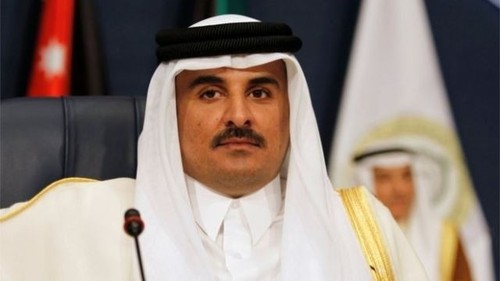 Qatar’s Emir Sheikh Khalifa bin Hamad al-Thani (Reuters) Qatar’s Emir Sheikh Khalifa bin Hamad al-Thani (Reuters) |
The crisis was ignited in May when Qatar’s Emir Sheikh Khalifa bin Hamad al-Thani made some tough political comments on sensitive issues like Iran, the Palestinian Hamas movement, Israel, and the US. First Saudi Arabia, then other countries, cut diplomatic relations with Qatar and accused Qatar of being too friendly with Iran, supporting extremist Sunni Muslims, and pursuing policies that disrupt regional stability.
Qatar has rejected all accusations, saying Emir Al-Thani did not say anything inappropriate, and that hackers hacked into the website of Qatar’s state-run news agency QNA and posted a fake story quoting the Emir as making controversial statements. Qatar has asked the FBI to investigate. The backlash of Qatar’s Gulf neighbors intensified when Saudi Arabia, Egypt, Bahrain and the UAE released an ultimatum of 13 points asking Qatar to close its Al-Jazeera TV station, halt assistance for extremist and terrorist groups, cool its relations with Iran, and not allow Turkish troops in Qatar. Qatar rejected the requests, saying they violate Qatar’s sovereignty.
What is the true reason?
Behind the accusations lie a struggle for power, centered on Qatar’s expanding diplomatic role and deepening relations with Iran. While Saudi Arabia wants to establish a Sunni alliance to confront Iran, a predominantly Shiite nation, Qatar advocates better relations with Iran. It was for this reason that Saudi Arabia and the others boycotted Qatar under the pretext of objectionable statements by al-Thani.
Qatar has submitted a petition to the World Trade Organization to sue its neighbors for imposing illegal trade sanctions. On August 26 Qatar announced it will resume full diplomatic relations with Iran, which is certain to widen the regional division.
Differences difficult to resolve
Iran’s main interest in the Gulf is Qatar’s natural gas fields. Qatar has tightened its relationship with Iran to compensate for economic losses caused by sanctions and isolation from other Arab countries. Analysts say the diplomatic tension in the Gulf has transformed regional relations. The Gulf Cooperation Council was built on strategic security and trust, but this conflict between Qatar and the other GCC members has already done long-term damage.
It’s hoped that diplomatic visits between Iran and Saudi Arabia scheduled for September will have a positive effect, but everything depends on whether goodwill and compromise can be summoned by both sides.